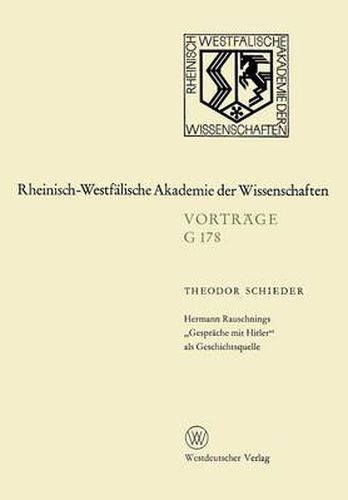Readings Newsletter
Become a Readings Member to make your shopping experience even easier.
Sign in or sign up for free!
You’re not far away from qualifying for FREE standard shipping within Australia
You’ve qualified for FREE standard shipping within Australia
The cart is loading…






This title is printed to order. This book may have been self-published. If so, we cannot guarantee the quality of the content. In the main most books will have gone through the editing process however some may not. We therefore suggest that you be aware of this before ordering this book. If in doubt check either the author or publisher’s details as we are unable to accept any returns unless they are faulty. Please contact us if you have any questions.
Bermann Rauschning’s book Gesprache mit Bitler , published first in French at the end of 1939, in German in 1940, and then translated into many other languages, was a world-bestseller. The conversations contained in this book between Bitler and Rauschning, then President of the Senate of the Free City of Danzig, took place in the years 1933 and 1934. The ques- tions arises whether these conversations are authentie and whether or not they can be regarded as primary historical sourees. There can be not doubt of the book’s deep and wide-reaching impact: Bitler’s war policy seemed to confirm its statements in many points. It still furnished evidence for the Nuremberg trial before the International Military Tribunal. After the Se- cond World War, however, the scholarly evaluation of the book was not unanimous: while a number of historians (e. g. B. Trevor-Roper, A. Bul- lock), who were interested in the person and the political system of Bitler, attributed a high source value to the Gesprache , others (e. g. A. Jacobsen, E. Jaeckel), proceeding from particular aspects, expressed strong criticism. An exact analysis of Rauschning’s book, in which the author’s earlier work Die Revolution des Nihilismus must also be included, demonstrates that, for the period of the conversations with Rauschning, there is at present no other primary source available which provides original statements of Bit- ler. That is also true of the establishing of contacts with Poland at the end of 1933 in which Rauschning’s services were of considerable importance.
$9.00 standard shipping within Australia
FREE standard shipping within Australia for orders over $100.00
Express & International shipping calculated at checkout
This title is printed to order. This book may have been self-published. If so, we cannot guarantee the quality of the content. In the main most books will have gone through the editing process however some may not. We therefore suggest that you be aware of this before ordering this book. If in doubt check either the author or publisher’s details as we are unable to accept any returns unless they are faulty. Please contact us if you have any questions.
Bermann Rauschning’s book Gesprache mit Bitler , published first in French at the end of 1939, in German in 1940, and then translated into many other languages, was a world-bestseller. The conversations contained in this book between Bitler and Rauschning, then President of the Senate of the Free City of Danzig, took place in the years 1933 and 1934. The ques- tions arises whether these conversations are authentie and whether or not they can be regarded as primary historical sourees. There can be not doubt of the book’s deep and wide-reaching impact: Bitler’s war policy seemed to confirm its statements in many points. It still furnished evidence for the Nuremberg trial before the International Military Tribunal. After the Se- cond World War, however, the scholarly evaluation of the book was not unanimous: while a number of historians (e. g. B. Trevor-Roper, A. Bul- lock), who were interested in the person and the political system of Bitler, attributed a high source value to the Gesprache , others (e. g. A. Jacobsen, E. Jaeckel), proceeding from particular aspects, expressed strong criticism. An exact analysis of Rauschning’s book, in which the author’s earlier work Die Revolution des Nihilismus must also be included, demonstrates that, for the period of the conversations with Rauschning, there is at present no other primary source available which provides original statements of Bit- ler. That is also true of the establishing of contacts with Poland at the end of 1933 in which Rauschning’s services were of considerable importance.